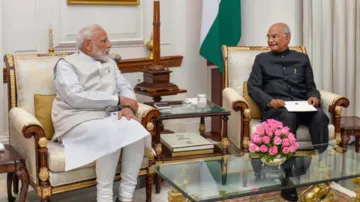One Nation, One Election: The Narendra Modi-led Union Cabinet approved the 'One Nation, One Election' proposal on Wednesday (September 18) which seeks to initially hold simultaneous elections for the Lok Sabha and state assemblies, and later extend it to local bodies as well. Prime Minister Modi has promoted this idea since 2014, especially during his second term. The BJP has long argued that holding elections simultaneously would promote fairness in the electoral process across the country. This concept has been part of the BJP's manifestos since 1984, the first nationwide Lok Sabha election contested by the party.
BJP’s electoral reform timeline from 1984 to 2019
- 1984: Simultaneous elections, EVMs, public funding of polls
- Voting rights for those above 18.
- Introduce voter Identity Cards.
- Use Electronic Voting Machines (EVMs); change the law if required.
- Explore list system of elections.
- Postal ballot rights for Indian citizens abroad.
- Hold state and central elections simultaneously every 5 years.
- Strengthen Election Commission as a multi-member body, independent from the Consolidated Fund of India.
- Extend Election Commission’s jurisdiction to local body elections and ensure regularity.
- Public funding of elections.
- Party accounts to be publicly audited.
- Strengthen the Code of Conduct; make violations a corrupt practice under the law.
- 1989: Compulsory voting, ban on company donations
- Ban on political donations by companies.
- Introduce compulsory voting.
- Empower the Election Commission to monitor media (Doordarshan and Akashvani).
- Set a ceiling on election expenditure for candidates, parties, and supporters.
- 1991, 1996: Incentivising company donations
- Allow donations to parties by companies.
- Provide incentives for open corporate funding to recognised political parties.
- Adopt Dinesh Goswami Committee’s report on electoral reforms.
- Grant statutory status to the Code of Conduct.
- Fresh delimitation of constituencies based on the 1991 census.
- Strengthen anti-defection law.
- 1998, 1999: Electoral reforms Bill, fixed five-year terms
- Introduce a comprehensive Electoral Reforms Bill.
- Ensure a fixed five-year term for all elected bodies.
- Examine the German system of ‘Constructive vote of Non-Confidence’.
2004, 2009: 1984 promises reiterated, simultaneous polls
- Reiterate the promises from 1984, with a focus on simultaneous elections.
- 2014: Eliminate criminality in polls, revise spending limits
- Commitment to eliminating criminality in elections.
- Propose simultaneous Assembly and Lok Sabha elections.
- Revise expenditure limits realistically.
- 2019: Simultaneous elections, single voters’ list
- Commitment to holding elections together.
- Introduce a single voters' list for all elections to avoid confusion caused by multiple lists.
Also Read: One Nation, One Election to Chandrayaan 4: List of key decisions taken by Modi cabinet today
Also Read: One Nation, One Election: Why is Centre planning to implement it, what are its benefits? | Explained
Latest India News
